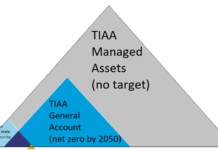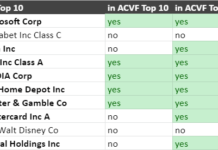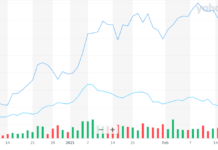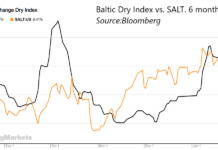Tom Konrad, Ph.D., CFA.
My recent market call now looks premature. What lessons can we learn?
When we make market predictions, we will inevitably be wrong some of the time. I stuck my neck out at the start of June, saying "We’re near the peak." I later gave some numbers to allow readers to objectively judge if that call was right or wrong. I said that we should consider it an accurate call if the S&P 500 fell 20% (to 756) before it rose 5% (to 992.) The S&P 500 has not yet come near 756, but it closed at the end of July at 987, very close to my upper limit. Although I remain bearish, I’m getting ready to admit that that market call was wrong, quite possibly before you read these words.
Why did I do it?
Before I made that call, I knew that the market had a good chance of proving me wrong. At the time, I said "This is mostly a gut feeling, but when it comes to predicting market moves, most methods (including my gut) are pretty worthless." Knowing that, why did I not just keep my mouth shut, and avoid subjecting myself to potential derision from readers? Furthermore, why am I now highlighting my probable mistake when I could just as easily choose not to write about it and distract readers with an article about a hot wind or solar stock?
Because I value my own humility. I write about many stocks to buy or sell, and it would be easy to find examples of outstanding performance, and forget about the calls that did not turn out so well. One of the more important benefits I get from writing my thoughts about the market is a permanent record of what I was thinking when I made the choices I did. Writing for an audience encourages me to work through and put down my thoughts at the time in much more detail that I would if I were just writing for myself.
By reviewing old articles, and conducting regular performance updates, I have a much better idea of when I was right or wrong, and why, giving me an opportunity to learn from my mistakes. The times I have been wrong also serve the valuable function of keeping me humble. I believe that an investor who loses his humility will soon lose his money as well.
What can I learn?
I can’t say I’ve learned much from this market call, since I already knew that most methods for predicting market moves (including my own) are pretty worthless. I’m still bearish, now thinking that the market call was too early, rather than wrong about the direction of the market. But the too-early call (if that is what it turns out to be) has helped keep me in touch with my humility.
One reader recently asked,
Why bother waiting to buy? Why not short the market and go long in these companies? Hedge out beta and you can take advantage of any edges these companies have without exposing yourself to the market. No waiting necessary.
The answer is simply because I know I could be wrong. At this point, I am still bearish, and I have "hedged out Beta" as the reader described; my portfolio as a whole has a Beta of somewhere between -0.1 and 0.2, as well as much lower volatility than the market as a whole. This means that I am unlikely to make or lose money due to moves in the market as a whole, although I can still make or lose money on my particular stock picks. But if I were confident in my market calls, I would actually take my Beta negative with additional shorting, and make money as the market fell (or lose money as the market rose.)
I don’t have that sort of conviction, and hence I wait in a neutral stance for either a market decline, or some other significant circumstance to change my mind.
The Benefits of Staying Out
Along the way, I talked a little about why it makes sense to get out of the market, even when you know you might miss a large upside move. I noted that an investor who manages to miss the greatest annual market declines at the price of also missing the biggest annual gains still comes out ahead, and commented that "The same will hold true for potential monthly, or daily returns." I thought it might be useful to back up that statement with a decade of monthly returns.
Standard and Poors provides a spreadsheet of monthly returns for the S&P500 here. For the ten years from July 1999 to June of 2009, the total return was -20.1%. The following chart shows the results of eliminating the n best and worst months over that period.
Total returns if an investor were to sit out of the stock market for the n best and/or worst months from July 1999 to June 2009.
| Number of months missed | Eliminating the best months only | Eliminating the worst months only | Eliminating both the best and worst months |
| 0 | -20.1% | -20.1% | -20.1% |
| 1 | -27.2% | -4.0% | -12.6% |
| 2 | -33.6% | +7.7% | -10.5% |
| 3 | -39.0% | +20.5% | -7.9% |
| 4 | -43.9% | +32.6% | -6.8% |
| 5 | -48.2% | +45.6% | -5.5% |
While I would clearly have lost touch with my humility if I thought I might be able to accomplish the returns possible by only skipping the worst months in the market, it is more reasonable to assume that I might be able to miss the worst months if I were also willing to miss out on the best months.
The asymmetric nature of stock market returns, with the bad months being worse than the good months are good means that this strategy also outperforms, as seen by the successively smaller negative returns in the last column. Just to make sure that this is not an artifact of the past decade of lousy stock markets, I also looked at the whole period supplied by S&P:
Total returns if an investor were to sit out of the stock market for the n best and/or worst months from February 1988 to June 2009:
| Number of months missed | Eliminating the best months only | Eliminating the worst months only | Eliminating both the best and worst months |
| 0 | +482% | +482% | +482% |
| 1 | +422% | +600% | +528% |
| 2 | +376% | +718% | +569% |
| 3 | +334% | +818% | +583% |
| 4 | +296% | +927% | +598% |
| 5 | +263% | +1030% | +604% |
As you can see, the pattern holds true, with the worst months hurting returns more than the best months help returns over the longer period.
In other words, it’s worth looking like a fool by missing a really good month in the stock market if it also means that you avoid a really bad month at some other time.
DISCLOSURE: None
DISCLAIMER: The information and trades provided here and in the comments are for informational purposes only and are not a solicitation to buy or sell any of these securities. Investing involves substantial risk and you should evaluate your own risk levels before you make any investment. Past results are not an indication of future performance. Please take the time to read the full disclaimer here.









Thanks, Tom
Your willingness to publicly examine your own investing makes this blog especially valuable to a me.
Re; Missing Best/Worst months…Excellent article. Thank you
Tom,
I said at the time:
“…Kudos to Tom. He may be a few percentage points early but booking 70% or so sure isn’t dumb.
And just yesterday, although I think it could quadruple over 36-48 months, I suggested a partner may want to write some calls on Trina (TSL)! ”
On the other hand, in our post “Al Gore, Tom Konrad and Climateer Investing Agree: Johnson Controls (JCI)”, I said:
“Between the three of us we have half a Nobel prize
(and a Primetime Emmy).”
Climateer… the JCI example shows that agreeing with others does not bring any guarantee of success, either.